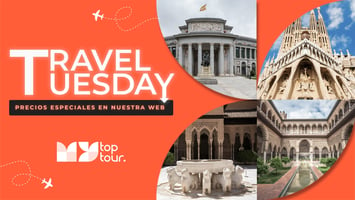Spain is a land of diverse cultures, rich histories, and breathtaking landscapes. From the vibrant...
Olé! Celebrate International Flamenco Day
Flamenco, declared a UNESCO World Heritage, is much more than just a dance. Discover the passion and history behind this unique art form.

| Índice de contenidos |
| 1. The History and Meaning of Flamenco |
| 2. Types of Flamenco Dance Styles or "Palos" |
| 3. Flamenco Legends: Iconic Artists in History |
| 4. Celebrating International Flamenco Day |
The History and Meaning of Flamenco
Flamenco originates from Andalusia, a region in southern Spain, and reflects a unique blend of diverse cultural influences, including Romani, Arab, Jewish, and Christian traditions. Born as a form of expression among marginalized communities, flamenco has grown over centuries to become a powerful symbol of Spanish identity.
Flamenco is more than just a dance; it’s a tapestry of traditions encompassing *cante* (singing), *toque* (guitar playing), and *baile* (dance). Each element holds its own significance, and together, they create an intense, emotional experience filled with passion and artistry.
Now that you’re exploring the magic of flamenco, we invite you to delve even deeper into this captivating culture by celebrating with us on International Flamenco Day. Join our special events throughout Flamenco Week!
Types of Flamenco Dance Styles or "Palos"
Flamenco is divided into various styles, or *palos*, each with its unique rhythm, structure, and character. Some of the most well-known *palos* include the **Soleá**, **Fandango**, **Bulería**, and **Alegría**. Each style has distinct qualities that make it special.
- Soleá: Known for its solemn and profound tone, Soleá is often deeply emotional and reflective.
- Bulería: In contrast, Bulería is vibrant and festive, full of energetic rhythms that make it ideal for celebrations.
- Alegría: As the name suggests (meaning “joy”), Alegría exudes a light, happy energy and is typically faster-paced.
These *palos* allow flamenco artists to convey a vast range of emotions, from melancholy and introspection to joy and exhilaration. In fact, there are over 50 distinct *palos* in flamenco, though each artist brings a personal interpretation, adding depth and uniqueness to the performance. This blend of structured tradition and individual expression makes flamenco a highly dynamic and evolving art form.

Flamenco Legends: Iconic Artists in History
Over the decades, many artists have left an indelible mark on the world of flamenco, pushing its boundaries and elevating its artistry. Among the most legendary figures are **Camarón de la Isla**, **Paco de Lucía**, and **Antonio Gades**.
- Camarón de la Isla: Known for his unique voice and profound emotional delivery, Camarón transformed *cante* (flamenco singing), resonating with fans worldwide. His work set a new standard for vocal expression in flamenco.
- Paco de Lucía: Widely regarded as one of the most influential flamenco guitarists, Paco de Lucía brought technical innovation and musical depth to *toque* (flamenco guitar), blending flamenco with jazz and classical music.
- Antonio Gades: As a celebrated dancer and choreographer, Gades was a master of *baile* (flamenco dance). His storytelling through choreography expanded flamenco’s narrative power and emotional range.
Celebrating International Flamenco Day
International Flamenco Day, celebrated on the 16th of November, was established in 2010 by UNESCO when it declared flamenco as an Intangible Cultural Heritage of Humanity. This day is a tribute to flamenco’s rich heritage and an opportunity to experience its magic firsthand.
With My Top Tour, you can immerse yourself in Andalucía’s essence and enjoy flamenco at its finest:
- Sacromonte: Known for its gypsy caves, this setting brings flamenco back to its roots in an intimate, earthy ambiance.
- Albaicín: A show here, with views of the Alhambra, offers a breathtaking experience of this heritage.
- Authentic tablaos: Witness flamenco’s intensity up close in a traditional tablao in Granada’s historic centre.
- Plaza de Toros: Experience a unique performance in this classic venue, which offers an unforgettable backdrop.
For more flamenco events and updates, consider following prominent flamenco festivals and institutions online or our social media. Celebrating flamenco is about honoring a cultural treasure, and International Flamenco Day is the perfect occasion to delve into its passionate world. ¡Olé! 💃


.png?height=200&name=Adobe%20Express%20-%20file%20(1).png)

